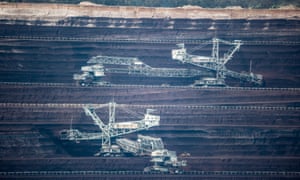The Engineers Declare movement pledges to put climate considerations first in evaluating plans
Engineering
firms are under increased pressure from their own employees to abandon
controversial fossil fuel projects, as the sector turns its attention to
the climate crisis.
About 1,000 Australian engineers and 90 organisations – including large firms and respected industry figures who have worked with fossil fuel companies – have signed a declaration to “evaluate all new projects against the environmental necessity to mitigate climate change”.
As the Australian Engineers Declare movement gathers pace, some industry figures say firms that work on Adani’s Carmichael coalmine project face a potential revolt from staff, and might struggle to recruit highly skilled people.
In the past few months, integrated services firms Aurecon and Cardno have both announced they would cut ties with Carmichael. The resources lobby has attempted to nullify the impact of environmental activism with veiled threats that companies might be effectively blacklisted from work on other projects. But little attention has been focused on a likely more compelling factor in those decisions – the influence of employees, whose expertise is the only real asset of most firms.
“I worked in the fossil fuel extraction industry and I’m proud of the
projects I worked on,” says Robert Care, the 2014 professional engineer
of the year, and one of the industry’s most influential figures. “But I wouldn’t do that work today, no I wouldn’t.”About 1,000 Australian engineers and 90 organisations – including large firms and respected industry figures who have worked with fossil fuel companies – have signed a declaration to “evaluate all new projects against the environmental necessity to mitigate climate change”.
As the Australian Engineers Declare movement gathers pace, some industry figures say firms that work on Adani’s Carmichael coalmine project face a potential revolt from staff, and might struggle to recruit highly skilled people.
In the past few months, integrated services firms Aurecon and Cardno have both announced they would cut ties with Carmichael. The resources lobby has attempted to nullify the impact of environmental activism with veiled threats that companies might be effectively blacklisted from work on other projects. But little attention has been focused on a likely more compelling factor in those decisions – the influence of employees, whose expertise is the only real asset of most firms.
Care said most engineers could recognise the energy sector was transitioning, and that they should help shape that transition rather than clinging to the way things are. The approach is in contrast to Australia’s resources sector, whose sales pitch has been focused on the provision of jobs in thermal coal.
“If we don’t act and act together, then at some stage in the future we will have … disenchanted, disenfranchised people, workers who have been cast aside,” Care said.
“I think we do now know there’s a problem with continuing the way we are. We’ve got to change. Now we know there’s a problem we need to work together. The young engineers I encounter, they understand the concerns and they want to be part of the solution.”
Engineers Without Borders Australia interacts with about 10,000 university students through training courses each year. The organisation’s chairman, Gavin Blakey, says young engineers care about building sustainable futures.
“As an organisation actively building the engineering workforce of the future, we are seeing an increasing number of students and professionals who passionately believe in the role the sector can play in addressing global challenges,” Blakey said.
Michael Green, the director of Bradman Recruitment, said engineers seeking work were clearly prioritising firms that made careful decisions about which projects they worked on.
“(Firms) will start having problems recruiting, particularly younger people. The last couple of years the climate emergency concept is there, it is affecting people’s decisions. If you’ve been lucky enough to pick up expertise in renewables, you’re going to be far more favoured by employers than those who don’t.”
Next week, environmental activists intend to again ramp up pressure on GHD, an engineering and services company whose statements about its work on Carmichael have not been definitive.
GHD has worked as a consultant and contractor for Adani in Australia for almost a decade. In a statement on its website, the company has made clear its contracts expire in December, but has not made clear whether it would consider future work.
Care said firms taking on controversial work could face a “revolt” from staff.
“GHD are now in the situation where no matter what they do they’re going to draw flack,” he said.
“We should be doing everything in our power to say we don’t do projects that are not going to benefit (the community and climate).”
One of the world’s most storied engineering firms, Arup, has signed on to Engineers Declare. The 12-point declaration acknowledges that engineers are connected to 65% of Australia’s greenhouse gas emissions and pledges to actively work towards a low-carbon future.
“Engineers are uniquely placed to make a significant contribution to tacking climate change, through the projects we choose to do and how we choose to do them, our ability to solve complex problems and the investments in research and innovation that we make,” the chair of Arup Australasia, Peter Chamley, said.

No comments:
Post a Comment